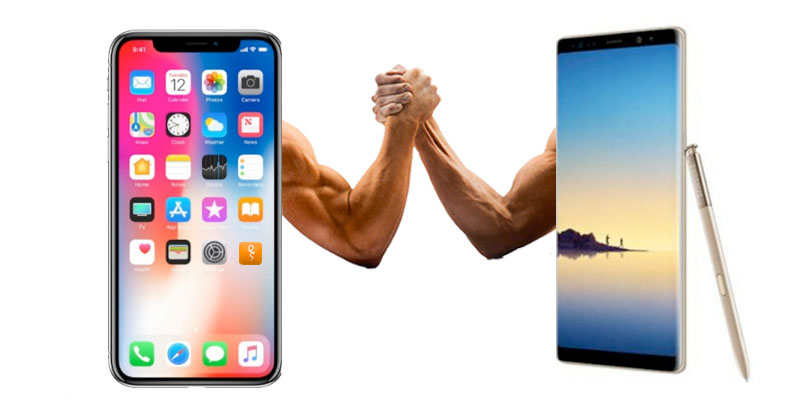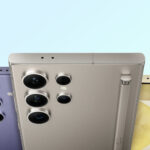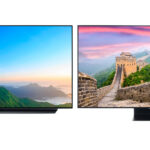When it comes to choosing a smartphone, the debate between iPhone and Samsung devices remains one of the hottest topics. Each brand has its loyal followers and offers distinct advantages and unique features. In this comprehensive comparison, we will dive deep into various aspects, including design, display, performance, software, and more, to help you decide which brand best suits your needs.
The competition between these two giants has pushed the boundaries of smartphone technology, leading to significant innovations and improvements. Whether you prioritize camera quality, battery life, or the overall ecosystem, understanding these differences is crucial in making an informed decision.
Related: Samsung Galaxy s22 Ultra vs Samsung Galaxy S23 Ultra Specs
iPhone vs Samsung
Choosing between iPhone and Samsung can be a daunting task. Both brands are industry leaders, offering many features and top-notch quality. This guide will break down the key differences to help you pick the perfect phone for your needs.
Design and Display
| Feature | iPhone | Samsung |
|---|---|---|
| Design Philosophy | Sleek, minimalist, uniform across models | Varied designs, foldable options available |
| Display Material | High-quality glass (ceramic on Pro models) | High-quality glass or plastic (depending on model) |
| Display Refresh Rate | Lower refresh rate (typically 60Hz) | Higher refresh rate options (up to 120Hz) |
Apple’s iPhones are renowned for their sleek design and premium build quality. The minimalist aesthetic with a focus on symmetry and continuity gives iPhones a modern, elegant look. Samsung, on the other hand, often pushes the envelope in design innovation, offering devices like the Galaxy Z Fold and Z Flip, which feature foldable displays that challenge traditional smartphone designs.
When it comes to displays, Samsung is a pioneer, especially with its Super AMOLED technology, known for vibrant colors and deep blacks. iPhones, while slightly behind in terms of pure specs, offer True Tone and wide color displays that are highly accurate and pleasing to the eye. The choice here often boils down to personal preference between realistic or saturated color profiles.
Camera
| Feature | iPhone | Samsung |
|---|---|---|
| Megapixels | Lower megapixel count (typically 12MP) | Higher megapixel count (varies by model) |
| Photo Quality | Excellent overall quality, great low-light performance | Excellent quality, more versatility with multiple lenses |
| Video Recording | Excellent video quality with high frame rates | Excellent video quality, some models offer 8K recording |
Samsung phones generally pack more megapixels in their cameras compared to iPhones. However, Apple excels in software optimization, delivering photos with great dynamic range and color accuracy. Samsung’s devices offer versatility with multi-lens setups, including ultrawide and telephoto options, that are great for capturing a wide range of subjects.
In real-world usage, both brands have their strengths: iPhones are known for their video recording capabilities, particularly in terms of stabilization and audio quality, while Samsung leads in features like 100x Space Zoom and Single Take mode, which are innovative and fun to use.
Performance and Battery Life
| Feature | iPhone | Samsung |
|---|---|---|
| Processor | Apple A-series Bionic chip | Qualcomm Snapdragon processor |
| RAM | Lower RAM compared to some Samsung models | Higher RAM options available |
| Battery Life | Generally reliable, optimized for performance | Can vary depending on model and usage |
Apple’s proprietary A-series chips consistently top performance benchmarks, making iPhones some of the fastest devices available. Samsung’s high-end models, which often use Qualcomm Snapdragon chips in the U.S., are also powerful, but they can exhibit some variation in performance in international markets where Exynos chips are used.
Battery life is a crucial aspect for many users. iPhones have improved significantly in battery life with recent models, though they still typically lag behind many Samsung models in terms of sheer battery size. Samsung offers more flexible charging solutions, including faster wired and wireless charging, as well as reverse wireless charging.
Software
| Feature | iPhone | Samsung |
|---|---|---|
| Operating System | iOS | Android |
| Updates | Timely and consistent updates (up to 5 years) | Updates vary depending on model and carrier |
| Customization | Limited customization options | Highly customizable interface |
The choice between iOS and Android can be a deciding factor. iOS is praised for its simplicity, timely updates, and integration with other Apple products, making it ideal for users who value a seamless experience across devices. Android, used by Samsung, offers more customization options and is generally more open and appealing to users who enjoy personalizing their devices.
Apple’s ecosystem is arguably its biggest strength, with seamless integration across its devices, including iPads, Macs, and the Apple Watch. For Samsung users, the integration with other Samsung products like Galaxy tablets, watches, and even appliances can be a strong draw.
Other Features
| Feature | iPhone | Samsung |
|---|---|---|
| Water Resistance | All models are water-resistant | Most models are water-resistant |
| Storage Options | Lower base storage options | Wider range of storage options |
| Expandable Storage | No expandable storage | Some models offer expandable storage via microSD card |
Both Apple and Samsung offer devices with robust build quality and durability. Recent models from both brands typically feature glass fronts and backs with metal frames and are equipped with water and dust resistance. Apple’s Ceramic Shield, introduced with the iPhone 12, promises four times better drop performance.
Samsung often leads in introducing new technologies like foldable screens, edge displays, and integration with other Samsung devices. Apple, meanwhile, focuses on user privacy, data security, and the smooth operation of its ecosystem.
Pros & Cons
iPhone
Pros:
- User-friendly interface
- Excellent photo and video quality
- Timely software updates
- Strong build quality
- Tight integration with other Apple products
Cons:
- Limited customization options
- Lower base storage options
- No expandable storage
- Generally more expensive
Samsung
Pros:
- Higher refresh rate displays (on some models)
- More storage options (including expandable storage on some models)
- More versatile camera systems (on some models)
- Greater customization options
Cons:
- Software updates can vary
- User interface can be less intuitive (for some users)
- Build quality might not feel as premium on all models
Which Should You Buy?
The ideal choice depends on your priorities.
- Go for iPhone if: You prioritize a user-friendly experience, excellent cameras, and timely software updates. You also value tight integration with other Apple products.
- Go for Samsung if: You prefer a more customizable phone with a wider range of display and storage options. You also desire a more versatile camera
Who Should Upgrade?
Upgrading depends on your current phone and needs. Here’s a breakdown:
- Upgrade from iPhone: If your iPhone is more than 3-4 years old and feels sluggish, or the camera quality no longer meets your needs, an upgrade might be worthwhile.
- Upgrade from Samsung: Similar to iPhones, consider upgrading if your Samsung phone is more than 3-4 years old and shows signs of slowing down, or the features don’t align with your current needs. Upgrading within the Samsung ecosystem might be an option if you value features specific to their latest models.
- Switching from iPhone to Samsung: Consider a switch if you desire a more customizable experience, a higher refresh rate display, or expandable storage.
- Switching from Samsung to iPhone: This switch might be ideal if you prioritize a simpler interface, timely software updates, or want tighter integration with other Apple devices you own.
Final Thoughts
Both the iPhone and Samsung are excellent smartphone choices. By understanding the strengths and weaknesses of each brand, you can make an informed decision based on your individual needs and preferences. Consider factors like design, camera quality, performance, software ecosystem, and budget before making your final pick. Ultimately, the best phone is the one that best suits your lifestyle and priorities.
Related: Samsung Galaxy s24 vs Samsung Galaxy S24+ Specs
iPhone vs Samsung FAQs
Q: Which brand is better, iPhone or Samsung?
A: There’s no single “better” brand. It depends on your needs and priorities (see the article for details).
Q: What are the main differences between iPhone and Samsung?
A: Key differences include operating system (iOS vs Android), design, camera features, software updates, and customizability (see the article for a breakdown).
Q: When should I upgrade my iPhone?
A: Consider upgrading if your iPhone is older than 3-4 years old, feels slow, or lacks camera quality.
Q: When should I upgrade my Samsung phone?
A: Similar to iPhones, upgrade if your phone is older than 3-4 years old, performs poorly, or lacks the features you need. Upgrading within Samsung might be an option for the latest features.
Q: Should I switch from iPhone to Samsung?
A: Consider switching if you desire more customization, a high refresh rate display, or expandable storage.
Q: Should I switch from Samsung to iPhone?
A: Switching might be ideal if you prefer a simpler interface, guaranteed software updates, or tighter integration with other Apple devices.
Q: Which brand has a better camera?
A: Both offer excellent cameras. iPhones excel in low light, while Samsung offers more megapixels and multiple lenses on some models (see the camera section in the article for details).
Q: Which brand has a longer battery life?
A: It depends on the model and usage. iPhones are known for their reliable battery life, while Samsung’s can vary.
Q: Does Samsung offer expandable storage?
A: Yes, some Samsung models have expandable storage via microSD card, unlike iPhones.





